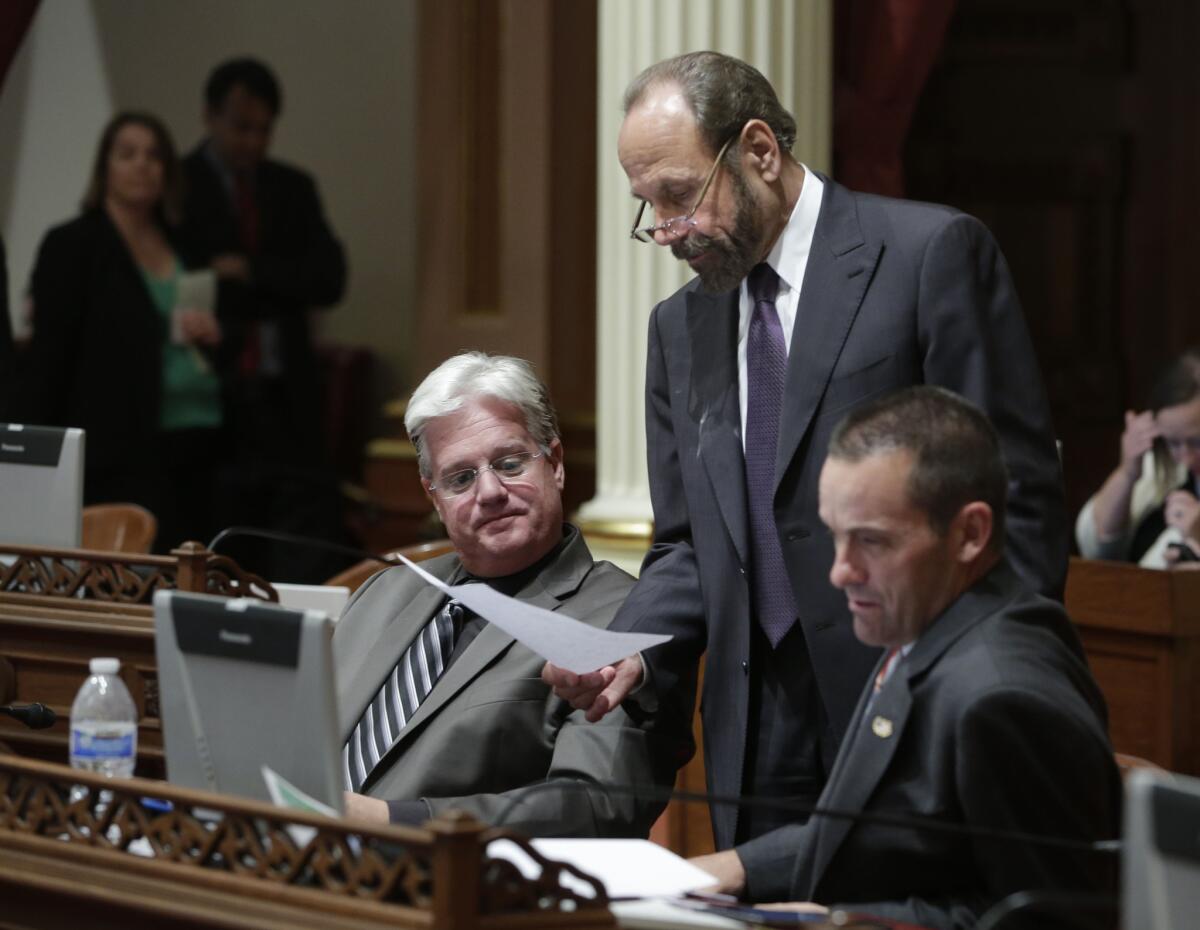California lawmakers propose anti-corruption law for state tax board

State Sen. Jerry Hill (D-San Mateo), center, discusses legislation with Sen. Andy Vidak (R-Hanford), left, and then-Sen. Steve Knight (R-Palmdale) in 2014.
Reporting from Sacramento — Current and former state senators are joining forces in an attempt to prevent conflicts of interest on California’s elected tax board.
State Sen. Jerry Hill (D-San Mateo) said Tuesday that he had introduced a bill that would forbid members of the state Board of Equalization from acting on any tax matters involving donors who had given any amount of money to their political campaigns in the previous 12 months.
Hill wrote the new measure in consultation with former state Sen. Quentin Kopp, the author of a 1990 law prohibiting members of the state board from acting on issues involving donors who contribute $250 or more.
See more of our top stories on Facebook >>
The Los Angeles Times recently reported that companies with an interest in board decisions have gotten around the limit.
Board Chairman Jerome Horton’s reelection campaign committee last year received 45 contributions of $249 each from executives, attorneys and other employees of the tax consulting firm Ryan LLC. That totaled more than $11,000.
Board Vice Chairman George Runner received 25 contributions of $249 each from Ryan employees.
Hill’s proposal would bar members from acting on matters involving donors who give them any political contributions, even as little as $1.
“It just seemed that is a loophole that needs to be closed,” Hill said Tuesday. “It eliminates the perception that there could be a conflict that would affect a decision. There should be no question that the decision is based on its value.”
The issue is crucial because California has the only elected tax board in the country and its members have semi-judicial powers to rule on tax disputes between the state and taxpayers.
Horton said in an email Tuesday that he supported the concept but would “wait to see” if the bill will apply to secretaries, clerks and others who do not represent firms in board dealings and “if the same restrictions will apply to judges and the Legislature.”
Added Runner, “Contributions have never affected my decisions so I’m fine with whatever the Legislature and governor want to do.”
The proposal is supported by Kathay Feng, executive director of the campaign finance watchdog group California Common Cause.
“The BOE’s role as an adjudicator of state tax matters means that millions of taxpayer dollars are at stake — they should be held to the highest standards to prevent even the appearance of a conflict of interest,” Feng said.
The Times’ story also noted that companies with matters before the board have gotten around the $250 limit on direct contributions by giving larger amounts to political action committees, that can then contribute to board candidates, and by giving cash gifts to charities at the behest of board members.
Hill said he was considering whether new laws could address those issues, but said doing so posed tricky political questions.
The courts have protected the operations of PACs, and many state officials, including Gov. Jerry Brown, frequently ask special interests to donate to their favorite nonprofit groups.
“I think that would be a difficult path to succeed on, at least in this particular year,” Hill said. “But that conversation will occur.”
For more, go to latimes.com/politics.
ALSO
Donors to state tax board candidates bypass contribution limits
California tax board mishandled money, state controller’s audit finds
More to Read
Get the L.A. Times Politics newsletter
Deeply reported insights into legislation, politics and policy from Sacramento, Washington and beyond. In your inbox three times per week.
You may occasionally receive promotional content from the Los Angeles Times.











